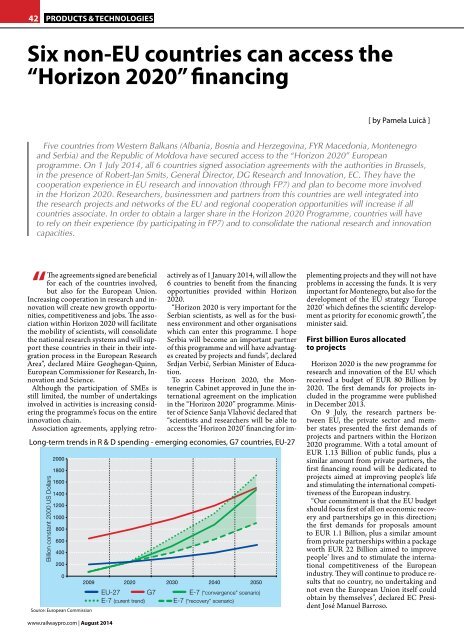Railway PRO
You also want an ePaper? Increase the reach of your titles
YUMPU automatically turns print PDFs into web optimized ePapers that Google loves.
42<br />
Market products development<br />
& technologies<br />
Six non-EU countries can access the<br />
“Horizon 2020” financing<br />
[ by Pamela Luică ]<br />
Five countries from Western Balkans (Albania, Bosnia and Herzegovina, FYR Macedonia, Montenegro<br />
and Serbia) and the Republic of Moldova have secured access to the “Horizon 2020” European<br />
programme. On 1 July 2014, all 6 countries signed association agreements with the authorities in Brussels,<br />
in the presence of Robert-Jan Smits, General Director, DG Research and Innovation, EC. They have the<br />
cooperation experience in EU research and innovation (through FP7) and plan to become more involved<br />
in the Horizon 2020. Researchers, businessmen and partners from this countries are well integrated into<br />
the research projects and networks of the EU and regional cooperation opportunities will increase if all<br />
countries associate. In order to obtain a larger share in the Horizon 2020 Programme, countries will have<br />
to rely on their experience (by participating in FP7) and to consolidate the national research and innovation<br />
capacities.<br />
“<br />
www.railwaypro.com | August 2014<br />
actively as of 1 January 2014, will allow the<br />
6 countries to benefit from the financing<br />
opportunities provided within Horizon<br />
2020.<br />
“Horizon 2020 is very important for the<br />
Serbian scientists, as well as for the business<br />
environment and other organisations<br />
which can enter this programme. I hope<br />
Serbia will become an important partner<br />
of this programme and will have advantages<br />
created by projects and funds”, declared<br />
Srdjan Verbić, Serbian Minister of Education.<br />
To access Horizon 2020, the Montenegrin<br />
Cabinet approved in June the international<br />
agreement on the implication<br />
in the “Horizon 2020” programme. Minister<br />
of Science Sanja Vlahović declared that<br />
“scientists and researchers will be able to<br />
access the ‘Horizon 2020’ financing for im-<br />
The agreements signed are beneficial<br />
for each of the countries involved,<br />
but also for the European Union.<br />
Increasing cooperation in research and innovation<br />
will create new growth opportunities,<br />
competitiveness and jobs. The association<br />
within Horizon 2020 will facilitate<br />
the mobility of scientists, will consolidate<br />
the national research systems and will support<br />
these countries in their in their integration<br />
process in the European Research<br />
Area”, declared Máire Geoghegan-Quinn,<br />
European Commissioner for Research, Innovation<br />
and Science.<br />
Although the participation of SMEs is<br />
still limited, the number of undertakings<br />
involved in activities is increasing considering<br />
the programme’s focus on the entire<br />
innovation chain.<br />
Association agreements, applying retroplementing<br />
projects and they will not have<br />
problems in accessing the funds. It is very<br />
important for Montenegro, but also for the<br />
development of the EU strategy ‘Europe<br />
2020’ which defines the scientific development<br />
as priority for economic growth”, the<br />
minister said.<br />
Box 2: Long-term global trends in research spending and technological performance<br />
Emerging economies are growing at a rapid pace and will soon transform the global landscape for research an<br />
<br />
First billion Euros allocated<br />
to projects<br />
and R & D spending ( 1 ), the emerging economies (Brazil, China, India, Indonesia, Mexico, Russia and Turkey) co<br />
investing the same volume of R & D as the G7 countries by 2050 and, Horizon by 2020, they is the could new programme already be for investin<br />
the EU. This expansion of R & D spending by the emerging countries research should and inevitably innovation lead of the to their EU which producing m<br />
received a budget of EUR 80 Billion by<br />
<br />
2020. The first demands for projects included<br />
2050, in the G7 programme share could were published have diminishe<br />
patent applications compared with only 8 % for the E7 countries, by<br />
<br />
in December 2013.<br />
On 9 July, the research partners between<br />
EU, the private sector and member<br />
shares states presented of PCT patents the first demands ( 2 ) — of<br />
Long-term trends in R & D spending —<br />
World<br />
projects and partners within the Horizon<br />
Long-term emerging trends economies, in R & D spending G7 countries, - emerging EU-27 economies, G7 countries, EU‐27 emerging economies, G7 countries, EU-27<br />
2020 programme. With a total amount of<br />
EUR 1.13 Billion of public funds, plus a<br />
similar amount from private partners, the<br />
first financing round will be dedicated to<br />
projects aimed at improving people’s life<br />
and stimulating the international competitiveness<br />
of the European industry.<br />
“Our commitment is that the EU budget<br />
should focus first of all on economic recovery<br />
and partnerships go in this direction;<br />
the first demands for proposals amount<br />
to EUR 1.1 Billion, plus a similar amount<br />
from private partnerships within a package<br />
worth EUR 22 Billion aimed to improve<br />
people’ lives and to stimulate the international<br />
competitiveness of the European<br />
industry. They will continue to produce results<br />
that no country, no undertaking and<br />
Source: European Commission<br />
Source: Directorate-General for Research and Innovation.<br />
Data: HSBC estimates of GDP growth, the OECD, World Bank.<br />
Source: not Directorate-General even the European for Union Research itself and could Innovation.<br />
Data: obtain OECD patent by themselves”, database. declared EC President<br />
José Manuel Barroso.


